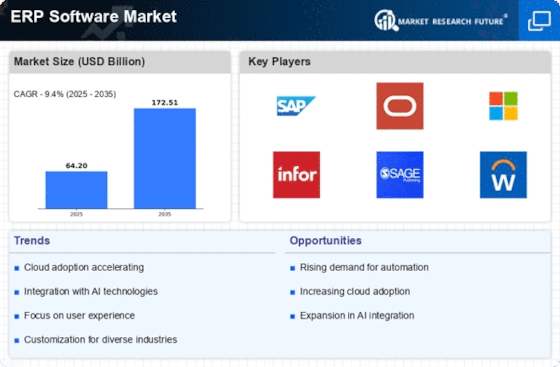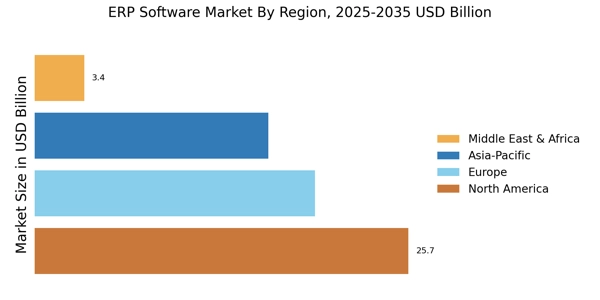Research Methodology on ERP Software Market
ABSTRACT
The present research aims to examine the growing trends of Enterprise Resource Planning (ERP) software solutions in the digital world of commerce. The research entails market analysis of two major geographies; North America and Europe, and further study of different applications of ERP solutions. The research report is developed as a comprehensive overview of the ERP software market, to provide a comprehensive in-depth analysis and evaluation of the most relevant trends in the industry. Desk research and primary survey methodologies are selected as the primary methodologies for data collection, alongside a quantitative approach to research the market.
INTRODUCTION
Enterprise resource planning (ERP) software is a suite of integrated applications used to align core business processes such as finance, inventory, human resources, and customer relationship management. This software solution helps companies to manage the core activities of their business, but also automate complex tasks such as data analysis, reporting and budgeting. This research is an effort to examine the current trends of ERP software solutions and forecast the future of the ERP landscape in both the North American and European digital markets. This report aims to provide an in-depth analysis of the various strategies adopted by key players and the competitive landscape of the ERP software market.
RESEARCH DESIGN
This research project employs both primary and secondary research techniques to analyze the ERP software landscape. Primary techniques such as desk research and primary survey methods are selected to collect data from the target audiences which includes leading players, vendors, IT professionals and organizations, industry professionals, partners and executives in the ERP software industry. A quantitative approach is taken to analyze the market trends in the two geographic locations and to understand the various challenges faced by the industry.
METHODOLOGY
Desk Research
Desk research is the first step of our research. It involves studying the existing reports, documented analysis of the industry and reviews of industry players in the field of ERP solutions. Major online sources such as Google Scholar, JSTOR, Digital Library, and other credible research databases are utilized to study the literature on the topic. This approach enables to build of a conceptual base for the study and thereby assesses the current trends of the ERP software industry in the digital domain.
Primary Research
Following desk research, primary research is conducted to gain insights from the leading industry players, IT professionals and organizations, industry professionals, partners and executives in the ERP software industry. Primary research is intended to gather qualitative and quantitative data which helps in the identification of the key challenges and opportunities in the industry. In-depth interviews and surveys are conducted using an online survey tool. The survey design and interview questions are developed keeping the objectives of the research in mind.
Data Collection Methods
The data for the research is collected using two methods, namely – surveys and interviews. A survey form is designed which is sent to several IT professionals and industry experts who are likely to have first-hand knowledge regarding the ERP software industry. The survey questionnaire comprises questions which seek to gain information regarding the trends in the ERP software market, the challenges faced by organizations while transitioning to ERP solutions, and the future of ERP software solutions. The responses are collated and analyzed through statistical tools to yield effective data.
In addition to the survey respondents, interviews with leading industry experts are also conducted. The interviews provide in-depth insights and information into the industry trends and help in gaining better insight into the research questions.
Data Analysis
Once the data is collected from the respondents, it is subjected to statistical analysis using the software. The quantitative data obtained from the survey and interviews are used to determine the trends in the ERP software market, the key challenges faced by industry players, and the future potential of ERP software solutions in the digital world of commerce.
Ethical Considerations
This research is conducted with due consideration for the ethical implications of the research. All planned measures to ensure the protection of participants’ rights, safety, autonomy and well-being are applied. Any data collected remains confidential and no individual responses are reported.
CONCLUSION
This research is undertaken to conduct an extensive analysis of the trends and challenges in the ERP software market, with a special focus on the two leading geographic regions – North America and Europe. The research design consists of desk research and primary survey methodologies with a quantitative approach to collating data from the target respondents. The results obtained from this research provide a comprehensive analysis of the current market and provide insights into the potential of the ERP software industry in the digital world of commerce.


















